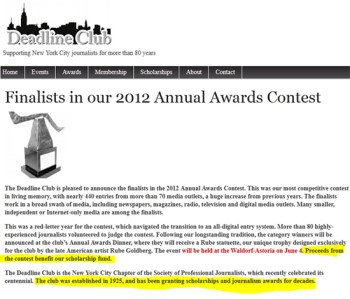
Only the proceeds from the entry fees paid directly to the Deadline Club Foundation, pay for scholarships--not the lion's share of the monies paid for dinner tickets. (Credit: Deadline Club, screenshot, highlight added).
Our interest in this story began in January, when iMediaEthics’ publisher and editor-in-chief Rhonda Roland Shearer, a member of the Deadline Club and the Society of Professional Journalists, received an email from the club about the annual awards. We sent an email inquiry to the club to learn the basic information about the awards and scholarships for what we expected to be a brief story.
The Deadline Club’s refusal to provide basic figures on membership and contest entries struck us as odd. [Meanwhile, the Press Club of Long Island, the other SPJ Chapter in New York, offered its membership figures (“close to 150 members”) and contest entry totals (“more than 460”) without incident.] So we looked closer at the confusion between the prestigious and plush event that conflates charitable and non-charitable activities and accounting into one supposedly charitable event.
| Only a small % of event proceeds go to scholarships, the charitable purpose of the Deadline Club Awards, while the club website soliciting 2012 ticket sales says: “Don’t miss this opportunity to mingle with journalists from The New York Times, The Wall Street Journal, The Associated Press…” |
We soon found hints at why the Deadline Club’s president seemed reluctant to help us do the math. The Deadline Club and the Deadline Club Foundation spend only a small fraction of the contest’s annual contest income on scholarships — and do little in the way of soliciting applications for the funds they do disburse. Meanwhile, both organizations have been chronically delinquent on filing financial paperwork required by the IRS and the New York State Attorney General’s office that regulates charities.
Foundation and Club failed to file required annual IRS & New York State forms
iMediaEthics also discovered that the Deadline Club Foundation, a 501(c)(3) , failed to file eight years of annually required New York State forms (see page 12, link here) to the New York State Attorney General (AG) New York State Charities Bureau (2001, 2002, 2004, 2006, 2007, 2008, 2009, 2010) and two years (2009, 2010) for the IRS, putting the registration of the charity at risk and generating further scrutiny by the Attorney General’s office.
The Deadline Club, a 501(c)(6),(1) was no better at filing tax forms. After writing a letter to the IRS in 2000 (see letter here) asking for forgiveness and no penalties for non-filing, the Club continued to fail to file. It was only in 2010 that then-Club president, Rebecca Baker, filed missing 2006, 2007 and 2008 IRS forms. Baker stepped down as president last year when her term ended, but still serves on the executive council.
See the below image where Baker signed and submitted the 2006 missing 990 in 2010.

Then-Club president, Rebecca Baker, filed the delinquent 2006, 2007 and 2008 IRS forms in 2010. Above is the signature from the 2006 990 IRS form that was signed August 5, 2010.
The Deadline Club ’s two years of missing IRS filings are shown here on the IRS website:

The Deadline Club Foundation failed to file IRS annual return forms in 2009 and 2010 as shown here on the IRS website.

The Deadline Club Foundation’s eight years of delinquent New York State tax filings are shown here in the New York Attorney General’s Charity Bureau page:
Here is the list of the Deadline Club’s IRS mandated annual 990 forms as displayed on GuideStar, a database for information on nonprofits. Six years–2000-2005–are still missing.

Six years of the Deadline Club’s IRS 990 forms– 2000-2005–are still missing–see above list from GuideStar, a database for information on nonprofits.
GuideStar checked its database for iMediaEthics and confirmed that it never received the Deadline Club’s 990 forms for years 2000, 2001, 2002, 2003, 2004 or 2005 — most likely indicating, according to GuideStar, that the IRS never received them from the Club. We contacted Baker about the missing 990 filings from 2000-05 and will update this story with any response.
iMediaEthics has also contacted the IRS for further verification since the present Deadline Club treasurer, Peter Szekely, would not answer our questions about the missing six years of 990’s, referring us to the club president, Tarquinio, who hasn’t responded to us since March 8, a fact that didn’t sway Szekely.
.JPG)
Club president J. Alex Tarquinio at the 2009 Deadline Club Awards Dinner at the Waldorf-Astoria. (Credit: John Smock)
After iMediaEthics requested information about the eight years of the foundation’s missing filings, the New York Attorney General’s office contacted the Deadline Club Foundation. Five of the missing years (2006, 2007, 2008, 2009, 2010) have recently been posted in the New York State Charities Bureau’s web site.






